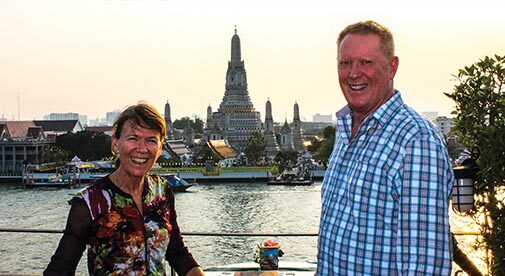One of my biggest fears is sitting in the dentist’s chair, and I assume I’m not alone. It is nothing personal, though it is a deep-rooted dislike (pardon the pun) going back to my childhood living in regional towns in Australia. Every few months, a dentist visited for a few days, completing whatever treatments were needed.
An empathic “chair-side manner” was not a prerequisite for those visiting dentists, or so it seemed. It also appeared that removal was more time-effective than repairing and filling the tooth. I don’t recall local anaesthetic being used, and as my long-distant memories tell it, tooth extraction was simply a pair of dental pliers and a knee to the patient’s chest.
I have since come to terms with dentists, and now see them as a necessary “evil.” Thankfully, as the years have passed, the profession has developed a lot more patient-focused care. Once I find a dentist I feel comfortable with, I tend to stick with them as they, too, get used to me. Their retirement funds have also prospered thanks to various dental works I have had done over my lifetime. But those familiar dentists are not here in Thailand, where my wife, Vivien, and I have taken our overseas retirement.
Recently, I woke with a high temperature, and the right side of my face all swollen. Perhaps I’m being melodramatic, but images of John Hurt’s character in The Elephant Man came to mind as I looked at myself in the mirror. Additionally, I was in a fair amount of pain and discomfort. Adding to my natural concern about dentists was the fact we were a month into lockdown for the coronavirus pandemic. Could I even get an appointment? Thankfully, the answer was yes.
Due to government-imposed coronavirus restrictions on movement, and a host of new safety precautions, just entering the dental clinic for those first few appointments was like nothing I’d experienced before. Temperature checks were accompanied by a detailed pandemic-specific questionnaire, mandatory hand sanitizing, wearing of face masks unless in the treatment chair, and enforced social distancing in the waiting rooms. Entering the treatment room was like entering a highly sterile operating theater and was followed by 30 seconds of gargling a special mouth wash before treatment started.
Although it all seemed a little over the top at the time, Thailand’s low incidence of the virus suggests it was a successful approach. During my visit, I very quickly felt my fears dissipate. Doctor Nana’s excellent English and very caring manner added to a growing sense of reassurance. She promptly had the issues diagnosed, the treatment recommended, and a course of antibiotics prescribed for the facial swelling.
It seems that there was an issue with the root of a tooth, meaning a root canal procedure. But that tooth was one of the anchors for a bridge of three teeth in my upper mouth. A bridge that had been in place for more than 20 years. The bridge had to go, and a temporary one put in its place. Due to the pandemic lockdown health precautions, the root canal specialist was not taking appointments. It took a month to get that appointment and, in the meantime, Doctor Nana did what she could to manage the situation.
Now, some two-and-a-half months later, all required treatments are completed, including the discovery and removal of another potentially problematic partial tooth root underneath the bridge. My new permanent bridge is now in place and, hopefully, will remain undisturbed for another 20 or more years.
About $1,350 for nine visits, X-rays, and treatments.
The total cost of all the treatments from start to the final appointment was 42,000 baht, which equates to approximately $1,350. That’s nine appointments with the dentist or root canal specialist, initial antibiotic treatment, several X-rays, the temporary and final bridge, and all other incidentals. I can’t imagine what I would have paid in Australia or the U.S., but it would have been well above that, for sure.
All the work was done in my dentist’s downtown clinic. She’s not a high-end dentist, just one of the many highly competent general practitioners who operate here. As seems to be the norm, Doctor Nana completed her initial dentistry qualifications in Thailand, and then went on to complete further study overseas. She successfully completed a Certificate in Prosthodontic Dentistry at New York University, plus further studies in Frankfurt, Germany. Additionally, her English and that of the root canal specialist was excellent, making communication clear and easy.
Any initial concern I may have had about the competency and professionalism of the dentists here in Thailand has been totally wiped away thanks to Doctor Nana and her clinical team. This is dental care that, to my mind, is superior to what I was used to back home—and at a cost that my limited healthcare budget can cope with.
I now understand why Thailand has developed such a strong international reputation for medical tourism—be it dental, cosmetic, or more specialist treatments. And from talking with other expats, Doctor Nana is simply another example of the quality healthcare we can take advantage of here.
Related Articles
Thailand is Renowned for its Excellent Healthcare
5 Things I Wish I’d Known Before Moving to Thailand
Enjoy a Low Cost of Living in Thailand
Upcoming Conferences
The Only 2024 Fast Track Panama Conference
If your dream retirement involves stunning beaches… lush green mountains… a warm climate with no hurricanes… first-rate healthcare… incredible value for money (a couple can live well on $2,200 a month)… and the World’s #1 Retiree Discount Program…
Join our Panama experts and expats in February and discover why Panama could be your perfect paradise.


.png)